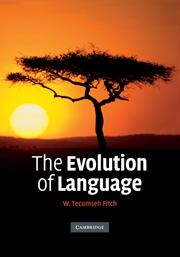Book contents
- Frontmatter
- Contents
- List of figures
- Acknowledgments
- Introduction
- SECTION 1 THE LAY OF THE LAND
- 1 Language from a biological perspective
- 2 Evolution: consensus and controversy
- 3 Language
- 4 Animal cognition and communication
- SECTION 2 MEET THE ANCESTORS
- SECTION 3 THE EVOLUTION OF SPEECH
- SECTION 4 EVALUATING PHYLOGENETIC MODELS OF LANGUAGE EVOLUTION
- Glossary
- Appendix: species names
- References
- Author index
- Subject index
- Species index
2 - Evolution: consensus and controversy
Published online by Cambridge University Press: 05 June 2012
- Frontmatter
- Contents
- List of figures
- Acknowledgments
- Introduction
- SECTION 1 THE LAY OF THE LAND
- 1 Language from a biological perspective
- 2 Evolution: consensus and controversy
- 3 Language
- 4 Animal cognition and communication
- SECTION 2 MEET THE ANCESTORS
- SECTION 3 THE EVOLUTION OF SPEECH
- SECTION 4 EVALUATING PHYLOGENETIC MODELS OF LANGUAGE EVOLUTION
- Glossary
- Appendix: species names
- References
- Author index
- Subject index
- Species index
Summary
Introduction
In this chapter I will discuss contemporary evolutionary theory as it relates to models of language evolution. I first attempt to give a brief, balanced overview of contemporary evolutionary theory, a condensed non-mathematical version of what one might receive in an undergraduate class on evolution, but tailored to questions concerning language evolution. I adopt a historical viewpoint because the history of evolutionary theory provides several nice examples of past success in the unification of warring disciplines – precisely what is needed, in the future, in biolinguistics. For those interested in the fascinating history of evolutionary theory, see Mayr (1982), Ruse (1986), Gould (2002), and Bowler (2003). For more detailed introductions to modern evolutionary theory, Dawkins (1987) gives an excellent popular introduction, and a good textbook is Ridley (1997), which also provides balanced overviews and detailed historical perspectives on some of the ongoing debates discussed below.
Second, I survey areas of controversy in language evolution. My guiding assumption is that evolutionary theory is general, applying to all living organisms: we neither need nor want a version of evolutionary theory specific to humans (Darwin, 1871; Hockett and Ascher, 1964; Pinker and Bloom, 1990). Language evolution is just another question for mainstream evolutionary theory, and special pleading about human evolution must be resisted unless clearly required by the data. Several major points of contention have yet to be resolved one way or another, and these will be my focus.
- Type
- Chapter
- Information
- The Evolution of Language , pp. 35 - 72Publisher: Cambridge University PressPrint publication year: 2010

